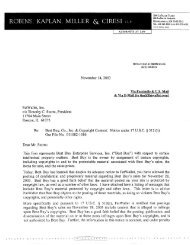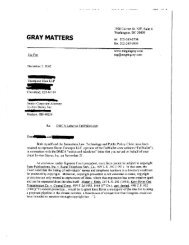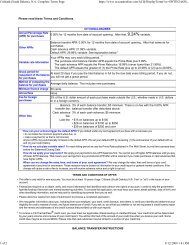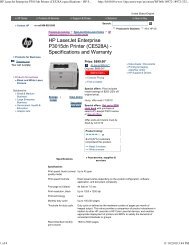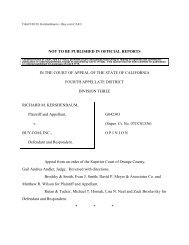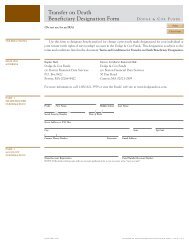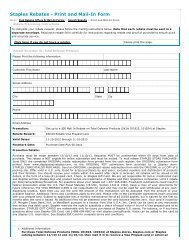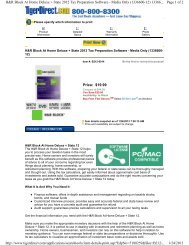HSBC Bank USA, N.A. - FatWallet
HSBC Bank USA, N.A. - FatWallet
HSBC Bank USA, N.A. - FatWallet
You also want an ePaper? Increase the reach of your titles
YUMPU automatically turns print PDFs into web optimized ePapers that Google loves.
performance. In addition, there can be no assurance that the Reference Security Return in the aggregate for the Reference Securities<br />
will be positive on any given Coupon Valuation Date such that you will receive any Coupon Payment Amount on the corresponding<br />
Coupon Payment Date.<br />
Investing in the CDs is not equivalent to investing in the Basket or the individual Reference Securities.<br />
Because the Reference Security Return of each of the Reference Securities is limited to the Auto Cap Rate of [9-13]% per Reference<br />
Security when each annual Coupon Payment Amount is calculated, it is possible for the Coupon Rate on the CDs for any given Coupon<br />
Payment Date to be substantially less than the simple price return of the Basket as measured from the Initial Fixing Date to the<br />
applicable Coupon Valuation Date.<br />
In addition, while the Auto Cap Rate will operate to limit your participation in the increase in the price of any Reference Security on a<br />
given annual Coupon Valuation Date to [9-13]% per Reference Security, you will be exposed to any decline in the price of any other<br />
Reference Security down to the Floor Rate -30.00%.<br />
Because the Floor Rate -30.00% is larger than the Auto Cap Rate of [9-13]% in respect to each Reference Security, the negative<br />
performance of one Reference Security may more that offset the positive performance of one or more of the other Reference Securities.<br />
Consequently, it is possible that declines in one or a few of the Reference Securities could offset any increases in the price of one or<br />
more Reference Securities that are limited by the Auto Cap Rate and that you could earn no Coupon Payment Amount even though the<br />
simple price return of the basket would have been positive on the applicable Coupon Valuation Date.<br />
Original Issue Discount Consequences of the CDs; U.S. Federal Income Tax Consequences.<br />
The Issuer intends to treat the CDs as “contingent payment debt instruments” for U.S. federal income tax purposes. U.S. Holders (as<br />
defined under “Certain U.S. Federal Income Tax Considerations”) will be required to include in their taxable income for each year an<br />
amount of ordinary income equal to the “original issue discount” (“OID”) on the CDs for that year. The OID is included in income and<br />
taxable at ordinary income rates. As a result, U.S. Holders may be required to include OID with respect to their CDs in income in each<br />
year in excess of actual payments received on their CDs.<br />
The amount of the OID that must be taken into income in each year will be calculated on the basis of the “comparable yield” of the CDs,<br />
which is the yield at which the Issuer would issue a non-contingent fixed-rate debt instrument having terms and conditions similar to<br />
those of the CDs. The comparable yield is determined by the Issuer as of the issuance date solely for U.S. federal income tax purposes<br />
and is neither a prediction nor a guarantee of what the actual yield will be on the CDs.<br />
The Issuer will prepare a “projected payment schedule” that produces the comparable yield. If the actual Coupon Payment Amount on<br />
any Coupon Payment Date or the Maturity Redemption Amount exceeds the corresponding amount on the projected payment schedule,<br />
the excess will be taxes as additional OID income to the U.S. Holder. Any gain recognized by a U.S. Holder on the sale, exchange or<br />
other disposition of a CD will constitute ordinary interest income.<br />
Prospective depositors should see “Certain U.S. Federal Income Tax Considerations” below and consult their tax advisors regarding the<br />
tax consequences to them of a purchase of the CDs.<br />
No Secondary Market for the CDs Exists. Depositors May Require the Issuer to Redeem the CDs Prior to Maturity Pursuant to<br />
the Early Redemption Provisions, but Depositors May Suffer Losses.<br />
There is currently no secondary market for the CDs. The Issuer does not intend to apply for listing of the CDs on any securities<br />
exchange, quotation of the CDs through the Nasdaq National Market System or designation for trading in the PORTAL market. There is<br />
no assurance that a secondary market for these CDs will develop, or if it develops, that it will continue. Even if a secondary market<br />
develops, there can be no assurance that it will provide significant liquidity. The Issuer intends to quote bid prices periodically upon<br />
depositor request, but is under no obligation to do so. In the event that the Issuer no longer provides such quotes, it may be difficult to<br />
obtain reliable information about the value of the CDs. The CDs are most suitable for purchasing and holding to maturity.<br />
10



